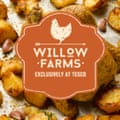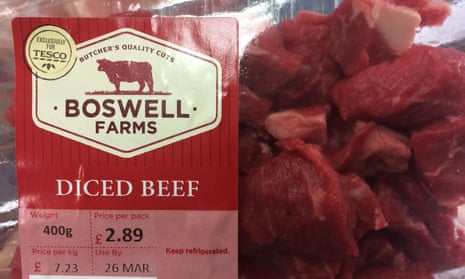Tesco has just launched a new range of meat and fresh produce with a series of farm names, including Boswell Farms’ beef steaks and Woodside Farms’ sausages. So far so bucolic. But, it turns out, all these farms are fictional. While the retailer says every product in the range, which includes vegetables, fruit, salad, pork, chicken and beef, is from “known farms” it has chosen to label them with fake ones.

The Guardian’s product and service reviews are independent and are in no way influenced by any advertiser or commercial initiative. We will earn a commission from the retailer if you buy something through an affiliate link. Learn more.
Confused? I certainly was. I tried searching online and called Woodside Farm just to check. They don’t sell any meat, but do give educational tours of the farm animals for children. And given the website for Boswell Farm talks about an idyllic Devonshire retreat with pilates classes, I assume it is unlikely to be the source of an entire range of Tesco beef products.
Notwithstanding the coincidence of similar sounding real farm names, Tesco says that some of the farm names (there are seven in total) were at one point real too, but that none of them are now. It says they were designed to be distinct brand names, not farms and part of a plan to simplify its food ranges.
Using fictional farm names is not unique. Aldi does it too. But it is a tactic that seems to go against the consumer trend for accurate information about where food comes from – something Tesco acknowledged and promised to improve after it was caught up in the horsemeat scandal in 2013.
While a food buyer as big as Tesco can’t showcase all its suppliers, surely it isn’t helping the desire for provenance with its choice of British-sounding names such as Boswell, Woodside and Willow farms when some of the produce is imported. Perhaps it’s better for supermarkets to avoid publicising relationships with suppliers – should it come time to dump them, there’s no need for an expensive rebranding exercise.
Helen Browning, chief executive of the Soil Association, calls them “brands of convenience”. For supermarkets, that is, of course, rather than us – or the anonymous farmers. “People deserve better. We increasingly want to know where our food comes from, and we want honesty and authenticity, not deceptive veneers,” she says. So here’s a challenge for retailers. If you are ready and willing to tells us about the reality of farming today (be that indoor mega-farms or ugly veg), then please do it. If not, then don’t insult us with half-truths or confusion.

Comments (…)
Sign in or create your Guardian account to join the discussion